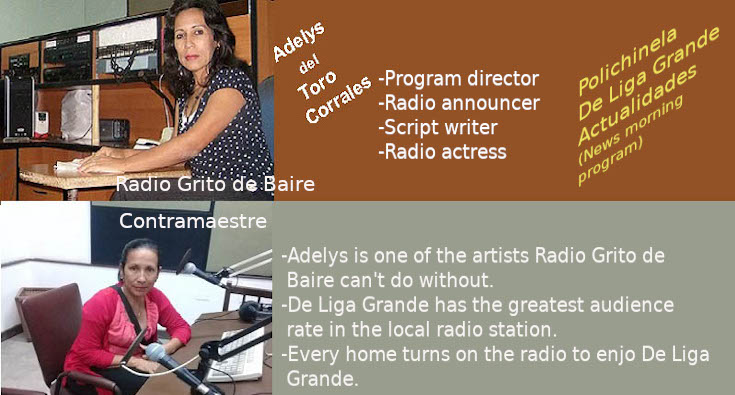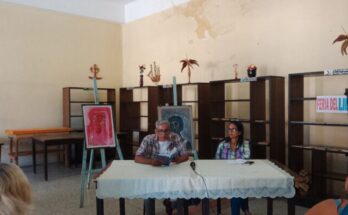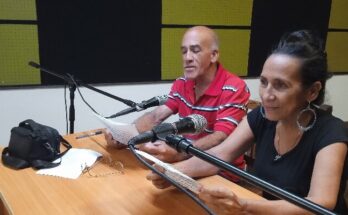Today we are speaking with Adelys del Toro Corrales, multi-awarded artist and founder of Radio Grito de Baire, in Contramaestre. We are going to know some important details of her life in summary, but we are going to start with a transcendental fact and the last of the very, very important facts in her artistic life.
Adelis, tell us about the awards won by Polichinela.
“Yes, very good afternoon. Thank you for sharing this time with me. We have just received six national awards with a single radio work. And this means a record for us because before, in the year 2000, we presented two works, five national awards, including the Grand Prize of the Cuban Radio, the Best Direction Award and the Best Female Performance Award. This time, in 2025, at the event Feliz Benjamín Cañé, which is sponsored by the UNEAC in Santiago de Cuba, we present a work written by the writer Carlos Miguel Pérez. This work is entitled Canta Bien Alto (Sing out loud) and it deals with migration, that is, it puts forward the story of an orphan child, whose father leaves the country and he stays to live with his grandmother and suffers the absence of his father, and the feelings found in that story in his school, in his daily life. At the end of the story, the child meets a teacher who supports him. And it is a work that refers to the emotions of a child.”
“So, this time, the program achieved six national awards, including the Grand Prize of the Radio, the Best Drama Award, the Best Children’s Program, the Best Direction Award, and the Best Male Performance Award. I told you that the program has an extraordinary trajectory. The Polichinela Program is founded by Radio Grito de Baire, and during these 35 years that we have just completed, on March 3, the program has turned 35 years old, and during this trajectory, the program has achieved more than 80 awards, including municipal awards, awards at provincial and national festivals, we have two international awards, won at Barbados, in addition to UNICEF awards, the UNEAD Caracol Award, in all categories, Best Direction, Best Male Performance, Best Female Performance, Best Advisory, Best Artistic Achievement, in short, we also had awards at the Yoga Contest in Santiago de Cuba, and so we have had a trajectory of achievements that are significant for the history of the program and that has brought the collective together to the point where every day we demand more for the creation of Radio Grito de Baire.”
Was this program selected for the festival or was it really chosen out of the everyday programs?
“We wrote, Carlos Miguel and I, we are screenwriters of the program. We are also actors, and in my case, directors. We are two, although there is a team behind it that supports us a lot, such as the advisor, Giovanni Acuña. The sound producer, in this case, was Osmar Barrios. But I want to tell you this, because, look, we don’t work for contests. We work every weekend, every Sunday, we make a play thinking of the children. We simply want to do it with the highest quality, the greatest care, the greatest effort when it comes to selecting the resources we use, let’s say music, resources, the artistic tools we have for an aesthetic elaboration of the play. So when we make a play with a contest in mind, we,from the selection we have, we think of a play that, due to the content, the way it was treated, and even the artistic realization, we consider that it could be listened to. But from several proposals, we have a radial proposal every Sunday.”
“We did not conceived the program for competition. We chose some of the programs to over them and decide which of them to take to the festival. it’s that from the proposals we have recorded, we think, this could be due to the subject it deals with, the way it was treated, the impact it had on the audience, and then we improve that play, we see the details, we go to the smallest detail, we improve somehow, and we send it to the contest.”
Is there a police play in the history that has marked you, that has stood out above the others, that has given you a mark, that you always remember, whether it has been awarded or not, whether it has been taken to the contest or not?
“Of course. There are two programs that impacted me a lot. Carapacha and El Río and Caballito de Plata (Little Silver Seahorse). In Caballito de Plata, I was the main actress, I was Caballito de Plata. And that year, it was in the year 2000, I was awarded the Best Female Performance, and that brought me a huge reward, because in that event, which was in the year 2000, in Camagüey, I have something to tell you. Almost every time I have a result, it is preceded by a family problem, a pain, an anguish, I don’t know why. I don’t know why. In 2000, I lost my father, and I didn’t want to get close to the radio. Those days were far away, sad, and Carlos Miguel goes to my house. Carlos Miguel, who is my co-worker, although I have worked with many, but he has always been by my side as a co-writer. And Carlos Miguel goes to my house, and invited me to prepare a play. Burt I told him at that moment I was really sad, I am sad, I am going through a bad time. No, I know, but precisely because I thought of your father, you have to make the effort to get that play, because no one knows the result it can have. And then I kept thinking about it, and I accepted it. Then I told him, well, let’s record, and we recorded Caballito de Plata, to the right or to the reverse.”
“That play, which was written by Carlos Miguel, took us to Camagüey, and in Camagüey, I had the good fortune to meet two important figures of the radio, Marta del Río, a singular actress, who is no longer physically present, but who approached me to applaud my play, to recognize me, to talk to me about the work we do for children, which she loved. That year she was sworn in. And the other was Carmen Solar, a very prominent figure of the radio, a personality of Cuban culture who is an eminence, still lives, luckily for us, Carmen Solar is already a very mature woman, very old, but she is still a symbol for us. And Carmen Solar, she approached me, and told me a lot about Polichinela, that she loved the play we presented. That, for me, simply, that was a prize. To have met those people that year in Camagüey, I shared, I had the joy of sharing with José Corrales, actor, with Odaly Fuente, and other personalities of the culture who made me feel that I was simply recognized for my work.”
“And from there, we also recorded Carapacha and the River, which I loved that play for the story it tells, that it is a peasant who has a friendship with a jicotea, which is Carapacha. The play is beautiful, beautiful. I also liked it a lot. Those plays marked my life a lot. You are the founder of Radio Grito de Baile. Some people say no. No. I still… You are the founder, because every time I ask people who can give me the information I need, they say yes. Among them, Paco Miranda, who is the founder, who is the root of this station, corroborates that you are the founder and other people too.”
Therefore, in your life, in Radio Grito de Baile, since the plant appeared, your professional life has been multifaceted. That versatility of yours, how has it been projected, how has it manifested itself in your story as a radio player?
“I always say that you have to be born with some artistic vein to be an artist. And when I was a child, I played a lot, I took some little things that served as microphones and I spoke and expressed myself. At school, I also did artistic demonstrations, I sang, I danced. And I think that’s where that root of mine came from, to get closer to the arts. But the radio was, how to say, a discovery. It was a labyrinth that made me enter here and there, as a director, as a writer, as an actress, as a speaker. And maybe I was discovering that in each specialty I was finding some reason to stay, and to improve at work, and to fall in love with work. I love what I do in everything I do.”
“As a writer, I enjoy it. As a speaker, I don’t even tell you. I tell you that I’m surprised by the people who call me at home, who see me on the street, who talk about my work.
As a speaker in De Liga Grande, as an actress in Polichinela, as a writer in Polichinela, as a director in Actualidades (Current news), I went through contact with Matutino (Morning Encounter). I mean, I went through historical, informative, recreative, cultural spaces. I was in Algo Más, in the foundation of Algo Más, the cultural magazine by excellence. And everything, everything has taught me a lesson. And everything has made me undertake knowledge, undertake overcoming. And overcoming myself, because I see it as a challenge, not towards others. I mean, it’s not about competing with others, it’s about competing with myself. And so, every time I present a work, or I’m going to do something, I try to do it better, because I don’t want to repeat myself, simply. And I want to leave a beautiful mark on people.
The contrast between the informative programs you’ve directed and De Liga Grande. It’s big. How is it possible to unfold so easily when you do it?
“Yes, of course. You have to unfold. Because I see as… It’s not that everything is not serious. On the radio, everything that is done must be serious, must be responsible, must have a level of discipline and self-improvement, as I was saying just now. But precisely that commitment to assume the direction of an informative program led me to graduate in journalism. Look at that. So, you have to see things as… That’s a challenge. It’s a challenge. And you have to take it as a challenge. It’s not to be afraid. The problem is not feeling afraid or not, it is simply a matter of facing a staff of journalists who are already professionally competent, who are actually experienced, and who know what to do. Why can’t I assume it? I go, I prepare myself in the diploma, I assume the news magazine and from there I try to find creativity, the way to find the structure, the beauty so that the listeners like the magazine. And I think I’ve achieved it. I know I can do better; upgrading never stops. I’m not saying that I’m doing a perfect work, far from it. But I think there’s a sense of belonging in the staff.”
“I’ve managed my staffs to have a sense of belonging, that my groups respect the work, feel love for the work. Each one of the members of my staffs is important, because my work, my result is not mine alone. It’s the result of people who support me, who accompany me in the work that I do and who understand and interpret what I want to transmit to the listener. It is a matter of team work. And those experiences that I am accumulating with those staffs are giving me the measure of how much I have performed on this radio station.”
How do you feed De Liga Grande program?
“Ah, I would like to be more, I swear. I enjoy De Liga Grande from the script because I write it. But I enjoy it with the music, with the listeners, with the people who participate, with those who come to the studio, with those who write, those who ask for a musical, those who answer a question, the people on the street, the workers’ groups. Right now, there’s a group that wants us to go to their work centers and the people feed them.”
Adalys Del Toro Corrales is a radio artist whose paves the way for future colleagues to achieve the highest qualified performance the audience will enjoy very much.




